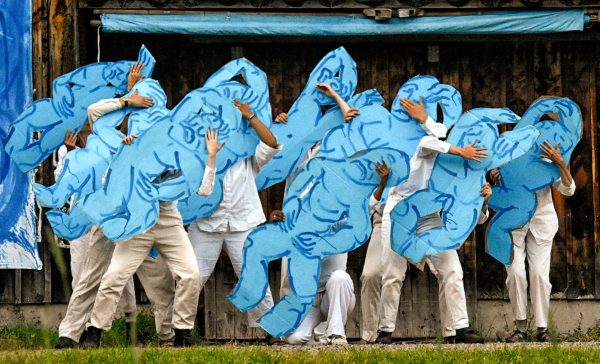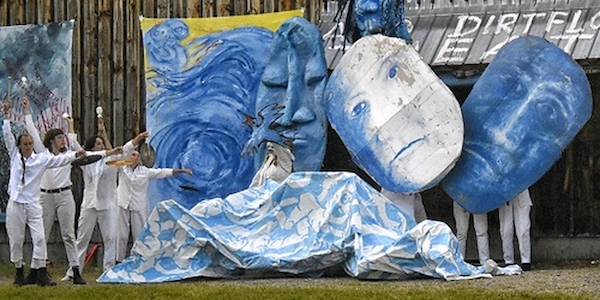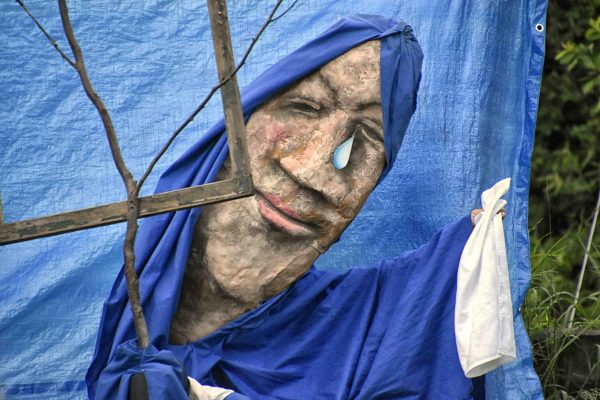Theater Interview: John Bell on Bread and Puppet’s Staging of Aeschylus’s “The Persians”
By Bill Marx
“The play challenges us to think about those we consider our enemies, and to think of them with compassion and understanding.”

Bread and Puppet veteran John Bell, director of the Ballard Institute and Museum of Puppetry at the University of Connecticut.
We demand that playwrights be courageous and speak truth to power. Unfortunately, history contains depressingly few examples of that kind of cultural challenge. Nowadays, dramatists and theater troupes, cheered on by compliant critics, routinely
brand themselves as mavericks. But they pretty much toe the conventional line, placating audiences who want to be assured of their righteousness. So it is inspiring when an example of theatrical nerve — thousands of years old — surfaces to show us how a complex truth inevitably contradicts self-congratulation.
Bread and Puppet Theater is producing a version of Aeschylus’s rarely staged tragedy The Persians (at the University of Connecticut’s South Campus Lawn on April 23 and 24). The Greeks had recently defeated these fierce warriors — at the battle of Salamis — and the theater competition in Athens was no doubt expecting a patriotic rev-up from Aeschylus, who had fought at that naval confrontation. Congratulations were certainly in order: a democracy had — through smart strategic planning — defeated a much larger force that was dedicated to tyranny. Instead, the dramatist gave the audience an unexpected and unwelcome shock — his earliest surviving script looks, with considerable empathy, at the Persians as they learn of their defeat at the naval battle of Salamis and passionately mourn their dead. Among The Persians bracing messages for the Greeks, writes scholar Thomas G. Rosenmeyer, is the assumption that joy is “fictive or short-lived,” a brief respite from “the common ground of fear.” The play is about the commonality of loss and, as a Persian monarch bitterly laments, the mystery of divine favor:
Let no man underrate his present fortune,
Spilling great prosperity in his lust for more:
Zeus sits above us as the punisher
Of thoughts that rise too high, a grim accountant.
I sent via email some questions about the production of The Persians to Bread and Puppet veteran John Bell, who is the director of the Ballard Institute and Museum of Puppetry at the University of Connecticut. Why add new material to the original? And how will audiences view the play at a time that the Russian war in Ukraine grinds on, driven by a technologically enhanced brutality that even Aeschylus could not have imagined?

A scene from Bread and Puppet’s staging of The Persians. Photo: Joseph Gresser
Arts Fuse: This Bread and Puppet production has had a long gestation. What is it about Aeschylus’s The Persians that demanded that it be produced?
John Bell: Around the corner from the Ballard Institute and Museum of Puppetry in Storrs, Connecticut (at UConn), there is an outdoor Greek theater under construction. Bread and Puppet has for many years performed its outdoor puppet circuses in a kind of natural amphitheater in northern Vermont, and the director, Peter Schumann, has an affinity for classic texts, so I suggested in 2018 that Bread and Puppet perform a show in the amphitheater, which is of course an amazing kind of theatrical space. Peter immediately responded in the affirmative, and suggested to do Aeschylus’s tragedy The Persians, which had been translated into German by, among others, playwright Heiner Müller. The play is fascinating because, unlike more well-known tragedies like Oedipus Rex or Antigone, there is not a dramatic “reversal of fortune.” Instead, things seem bad, and then stuff gets worse. The drama fascinates Schumann because Aeschylus was himself a war veteran who had fought against the Persians in the naval battle of Salamas and created a play expressing deep sympathy for the enemies of the Greeks. He writes:
When Athens commissioned Aeschylus to write the official celebration piece for the Greeks’ miraculous victory over the vastly superior Persian Empire invasion force they must have expected just that: a glorification of national prowess & skill. What they got instead is the opposite: heartrending compassion for the slain enemy, lamentation for the despairing mothers and widows of the slain warriors. Can our own permanently warring military industrial empire learn from this?
Although the situation is vastly different today, this play makes me think of Russia’s invasion of Ukraine, and our own ongoing invasions and military operations around the world — how can we understand what these wars do to people, to families, to whole societies?
I think most, if not all, of Schumann’s work is connected to the trauma he experienced during World War II in Germany, witnessing the aerial bombardment of cities, bodies washing up on the shores of the Baltic Sea and being collected by local villagers. He was a refugee who understands the importance of basic survival (which for him involves bread-baking) and distrusts all signs of patriotism, nationalism, and flag waving. Aeschylus (who himself experienced the trauma of war) was able to think about the effects of war on the Persians — the Greeks’ enemies — as aspects of a profound and difficult human experience. Schumann appreciates Aeschylus’s own particular understanding of this situation.
The play was first done in June 2021, in a collaborative creation overseen by Schumann at Bread and Puppet Theater in Glover, with musicians from the New York City new music group Ensemble Pi, and an amazing singer/musician now studying at New England Conservatory, Matthew Shifrin (who also has an amazing podcast, Blind Guy Travels). It was then performed in New York City in December, and in February at the Chicago International Festival of Puppet Theater.
AF: What was the biggest challenge in creating this production. And in mounting it?
Bell: Bread and Puppet’s process of creation is not simply realizing a prewritten script onstage with actors, stage design, and directing. Instead it calls for the construction of related moments that combine puppets, text, music, and choreography. In the first rehearsals Schumann described the show as a “Happening,” which hearkens back to the ’60s New York City milieu of performance art in which Bread and Puppet began. This kind of work depends on collaboration, improvisation, and the slow crafting of moments of performance that can be put together to make meaning. The process is overseen by Schumann, as director, but it really depends upon a lot of people thinking about and inventing things that might illustrate or represent the elements of story. It’s a tricky balance, involving watching and listening as well as stepping forward with some inspired or lame idea that may or may not end up being part of the show.
By now, however, the show has a clear structure that basically follows Aeschylus’s dramatic arc, with a prologue by Schumann in which he tries to make sense of the world. This past summer Peter’s wife and partner Elka Schumann, really the co-founder of Bread and Puppet, passed away, and that of course has been quite difficult for Peter and his family, as well as the Bread and Puppet community. But Schumann has continued to write, paint, sculpt, and create new shows, like Finished Waiting, which just recently completed a tour of the East Coast.
Perhaps it goes without saying that Covid has had a severe impact on art making of all sorts, especially theater. Bread and Puppet Theater has presented an unusual, if not unique, response in this respect, because the company figured out ways to work and perform amid stringent Covid protocols (guided by Clare Dolan, a puppeteer who is also an intensive care nurse); this allowed the company to perform every weekend in 2020 from June through September, at a time when no other theaters in the US were open. The creation of The Persians has taken place in rehearsal and performance situations marked by vaccine and testing protocols, mask wearing, and social distancing, which, when you are working with 20 performers and community volunteers, can become very complicated. So, this creation process has required a lot of perseverance.

A scene from Bread and Puppet’s staging of The Persians. Photo: Joseph Gresser
AF: Talk a little about the show’s visual and sound design. We are promised “giant puppet, flying plastic, Lubberland gesturing, a chorus of screams, and Johann Sebastian Bach.”
Bell: At this point, Bread and Puppet Theater has a large inventory of thousands of puppets. Schumann created some new flat cutout puppets for The Persians, but a good number of puppets and masks have been drawn from the theater’s storage rooms. The dominant colors of the show have been blue and white, including large pieces of white plastic (recycled from the many Vermont farms that wrap their giant hay bales in plastic), blue plastic tarps, and existing blue costumes and white and blue puppets and masks. It is not at all unusual that the creation of a Bread and Puppet production begins with a clear choice of color: black and white; gray; red; multicolors; or, as in the case of The Persians, a Mediterranean combination of white and blue.
The visual elements include large choruses of flat cutout chairs (representing the Persian population in one scene); a chorus of oversize cardboard clown masks with red cutout arrows which they manipulate; warriors represented by three-foot by four-foot papier machê relief heads; flat cutout horses which, when turned around, become skeletons; a chorus of blue cutout swimmers (actually used to represent the drowned Persian sailors); a giant blue rod puppet with oversize hands that can embrace 30 people at a time; and above all, a wide range of paintings on large bedsheets, used as cantastoria (narrated picture performances) as well as dynamic scenic elements that combine image and text. Schumann found a source for used bedsheets and since the Covid pandemic started has painted scores of bedsheet paintings. Their presence as moving images in a puppet show is really distinctive.
AF: This is a very free adaptation of Aeschylus’s text. There are characters such as Humanity and Bob the Butcher, the latter seeming to delight in the violence. Why did you create a play-within-a-play?
Bell: This, of course, was Schumann’s idea; I think he wanted to add his own perspective on the tragic situation Aeschylus describes by talking about the nature of human existence. “Homo Sapiens” is a masked character, played by veteran puppeteer Barbara Leber as Bob the Butcher, a kind of modern Everyman in a suit and tie who attempts to stage manage or bring order to the world. Humanity, played by Schumann’s grandson Ira Karp, starts out in the Prologue “glued to his chair.” The Prologue text, recited by a narrator who points to a series of cantastoria paintings, reads, in part:
Humanity; surrounded by comets, and books, and flowers, and snakes, is governed by chairs from above. The chair sits firmly on Humanity’s mind. Until Humanity’s mind brings blossoms — which you can see here in the form of roses . Unaffected by horseback-riding humanity’s yelling, the Chair now listening to chair language only. But Humanity’s yells get more urgent, until enlightenment is achieved. And here you see the enlightenment, and here the enlightened. Still, Humanity is deeply worried. What is next? Who is next? You? You? You? So Humanity requests the opposite of progress, which is Shrinkage! Shrink! Shrink! And Humanity also requests liberation from the Chair’s prison. You Chair, where to? What for? As Humanity realizes its chair-sitting destiny, and as collisions and disasters occur, and as the sun starts to swallow Humanity off its Chair, voila, revolution occurs!
Chairs have long been powerful images for Schumann: pretty basic and ubiquitous structures that are signs of human civilization, but also markers of humanity’s preference for sitting rather than becoming engaged. The Prologue ends with Humanity (helped by Bob the Butcher as Homo Sapiens) getting off his chair, which I think for Schumann represents the option of active engagement with one’s society, with one’s life, which in the text above he defines as “revolution.”
AF: It took enormous courage for Aeschylus to dramatize the Persians mourning for their dead. But, to my mind, this is not an antiwar play. Aeschylus had fought against the Persians and was happy that the outnumbered Greeks outsmarted their foe and won. What is your production saying about war?

A scene from Bread and Puppet’s staging of The Persians. Photo: Joseph Gresser
Bell: Well, theater of course is always open to interpretation, as generations of productions of Hamlet or Death of a Salesman show. Yes, Aeschylus fought in wars against the Persians, but, like many of the Vietnam vets who have worked with Bread and Puppet over the years, the experience includes trauma, and the deep understanding of what particular wars bring to the populations that experience them, such as now in Ukraine, Yemen, Afghanistan, Sudan, and Palestine. My Vietnam veteran friends have a very nuanced understanding of and relation to the country of Vietnam and its people; they travel there and try to connect with the country, even though their past actions brought violence and death to the place, and they themselves experienced violence and the death of their friends. What can be learned from such experiences? It’s pretty clear that wars are not positive experiences for anyone.
AF: What has been the audience’s reaction to the show when it has been performed? Aeschylus’s play is tragic in temper — his purpose was to challenge rather than reassure.
Bell: Yes, the play challenges us to think about those we consider our enemies, and to think of them with compassion and understanding. It is remarkable that Aeschylus was able to achieve this in Athens, to the dismay of those Athenians who were expecting a triumphalist celebration of victory.
AF: You are mounting this production about recognizing our common humanity at a time when the Russians are committing heinous war crimes in Ukraine, flattening cities, killing noncombatants. We are dealing with a brutality — powered by technology — that even Aeschylus could not have imagined. Does this undercut the show’s message?
Bell: No, I think quite the opposite: it presents the story of invasion, death, destruction, and defeat from a distanced perspective of 24 centuries ago. The Persians go off to war full of bravado and confidence, and Aeschylus shows us how that initial confidence slowly shifts as the news of difficulty and defeat comes in, until the dominant sentiment is mourning. Schumann uses the “Erberme Dich” (“Have pity”) aria from Bach’s St. Matthew Passion (beautifully sung by countertenor Matthew Shifrin) at the end of the show to articulate these realizations and feelings of loss which, as Aeschylus dramatizes, extend beyond the bounds of kingdom or nation. Instead, they articulate a very difficult aspect of human nature and human existence.
Bill Marx is the Editor-in-Chief of the Arts Fuse. For just over four decades, he has written about arts and culture for print, broadcast, and online. He has regularly reviewed theater for National Public Radio Station WBUR and the Boston Globe. He created and edited WBUR Online Arts, a cultural webzine that in 2004 won an Online Journalism Award for Specialty Journalism. In 2007 he created the Arts Fuse, an online magazine dedicated to covering arts and culture in Boston and throughout New England.

BRILLIANT work by Bread and Puppet! Such a terrific interview – John Bell speaks with such clarity and passion – and calm, which is a dynamite combination of attributes for a theater artist. We are lucky to have him among as, as a creator and historian and critic.
Excellent interview. Thank you very much for the depth, intelligence and clarity you bring to the subject.
John Bell is an amazing spokesperson for puppetry, especially the inimitable Bread & Puppet Theater.